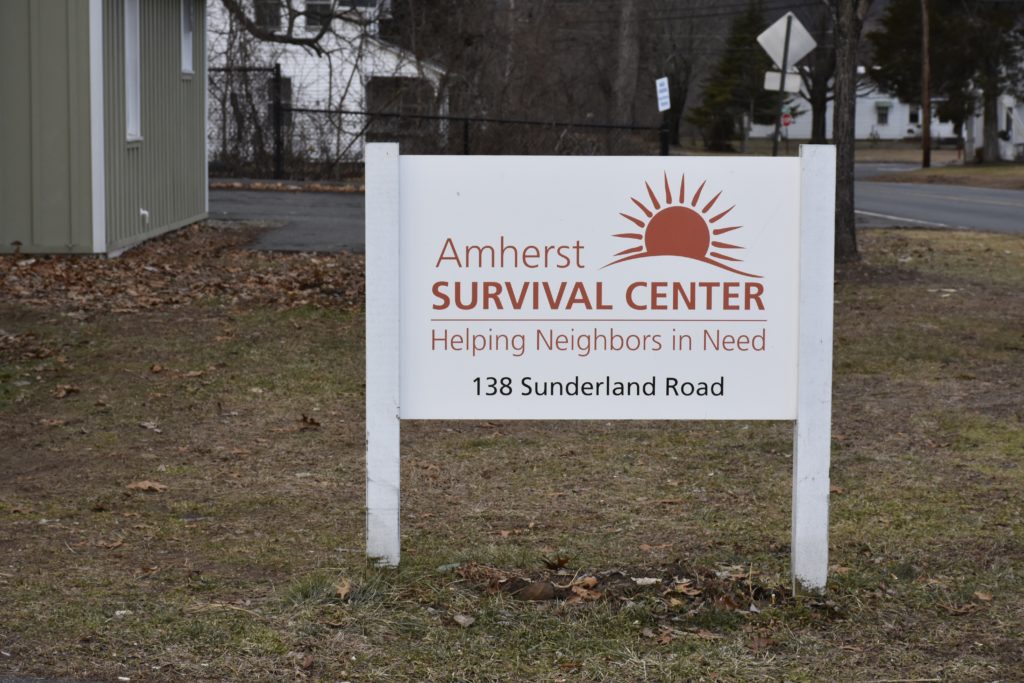A FEW QUESTIONS FOR LEV BEN-EZRA, DIRECTOR OF THE AMHERST SURVIVAL CENTER

Photo: Art Keene
A Few Questions For…” is an occasional feature of The Indy, aimed at helping our readers get to know the folks who are making things happen in our town. We’ll be featuring members of our town government, key town employees, people who lead civic organizations, activists, local educators, prominent volunteers, and residents who are not necessarily well known. This week we feature a conversation with the director of The Amherst Survival Center Lev Ben-Ezra.
Lev Ben-Ezra joined the Amherst Survival Center as its executive director in January 2019, finding that it is the perfect place to combine her passion for social justice, her commitment to making resources to meet basic needs accessible for all, and her skills at bringing people together to accomplish big goals. She has lived here since she was about eleven years old.
The Survival Center has long been an important resource in Amherst, making life better not only for people who are financially insecure, but for the hundreds of volunteers and other community members who participate. But now, more than ever, it is crucial to neighbors and friends.

INDY: The Survival Center must have changed quite a bit since COVID-19 and social distancing began. Instead of regular lunch, you provide bag lunches now, it says on your website. I imagine there’s been an increase in people who are food insecure, related to COVID.
Ben Ezra: We had to examine our priorities and grapple with questions like “What are the most immediate needs?” and, “How can we most effectively provide the most important services in a safe way?” As a result we’re focusing on food and nutrition programs. There’s definitely been an increased need due to COVID.
We served about 6,000 people a year in the past — 6,000 people experiencing food insecurity at a time when the economy was — supposedly — thriving. Well, it was thriving for some.
Now we quickly saw people who had lost one paycheck, then two or three paychecks due to COVID-19-related job losses, people who are facing food insecurity. Before COVID, there were about 90 or 100 people at meals. Now we might serve 198 bagged lunches in a day. We used to rely on about five people working in the kitchen to prepare lunch. Now, to maintain social distancing, we have a maximum of two or three people not only preparing the food but packaging it.
We’re seeing children who are home from school and their families are providing food that had previously been provided by the schools. With children home all of the time, families are going through a lot more food than they used to. The schools are doing a wonderful job of food distribution, with food trucks or other versions of distribution, and that’s wonderful for many families but there are also families for whom some aspect of the distribution isn’t working.
People who are new to the Amherst Survival Center, but feel insecure about using your services now, might be hesitant to do so. There’s this American element of proud independence, not needing help from anyone. How do you help people feel comfortable?
That’s a huge issue, the stigma around accessing services. An enormous problem. Historically the Amherst Survival Center has done well at this, with a vibrant community atmosphere. There’s a health clinic, a sewing program, movie nights, music on Fridays, lunches, groceries, clothing and housewares. We have completely open eligibility, we don’t ask questions about anyone’s needs, we welcome people of any income to have lunch, or [before COVID-19 social distancing] see a movie, or come to the health clinic. It’s critical that we be able to continue to play a role as a community center that offers resources, and make it welcoming.
That’s harder now and it’s especially harder for folks coming for the first time. We see that particularly with the food pantry. We are most aware of people coming there for the first time because unlike the other programs we’re required to keep track of the localities that people come from.
One of the messages I’m trying to get out is that we are all some steps away from not being able to buy groceries, and it’s not very far for many of us. And that we’re here for everybody. You don’t need to be in a place where you have absolutely no food on your shelf! It can be that you need money to pay your electric bill or your rent, and can’t also pay for your groceries. It’s hard to afford to live here, with its high cost of living.
Words “food insecure” can be off-putting, scary. There’s that stigma. The words “homeless,” even “survival” as in “survival center”as well. Do you have better words or phrases, so that people can feel more comfortable?
It’s a good question. In fact, the vast majority people who come here do have a stable housing situation. But for others housing can be precarious, unstable, and some don’t currently have homes. We see so many people — individuals, families, elders, young people, new immigrants, people who grew up in Amherst and have been here their whole lives, working, not working, able-bodied, disabled, it’s a really wide mix.
But I think it’s helpful to reflect on the definition of “food insecure,” which is, have you or your family in the last twelve months ever run out of food and not had money to buy food or have you ever been concerned that you were going to run out of food and not have the money to buy more, have you not been secure in where your groceries are going to come from?
What do you need from our readers? And what do you not need, perhaps clothing and other stuff from all the COVID cleaning people have been doing?
No clothing, no housewares — we have not been accepting anything for the community store since March. We’ve temporarily moved all of its contents into a trailer, offsite, because we need the space to store food. But we are still accepting registrations from new volunteers. We have an incredible volunteer cohort and they’ve been unbelievable. Before COVID, we’d had about 700 volunteers annually, 250 to 275 volunteers a week, at least half of them long-term. At first we had an immediate drop-off of volunteers because many students left the area when their colleges closed and many people could no longer volunteer because of their age or health needs, or they were self-isolating. But so many current and previous volunteers have stepped up now, including people who have more flexible schedules because they aren’t working outside of the home now or they aren’t working full-time. Or at all.
It’s been very interesting. We’ve needed to focus on efficiency to move the greatest amount of food through the building using the minimal number of people, all staying six feet away from each other, in the shortest amount of time. How do you do this?
One way is that we look to our volunteers to be more regular right now than in the past. Instead of working a one-, two-, or three-hour shift once a week, we have people working a three-hour shift every day or half-a-day several times a week or maybe a whole day once a week. There’s an increased level of commitment and volunteers really get to know an area of service well. We even have some people who are essentially volunteering full-time or close to it, and some are taking on leadership roles. They’re so knowledgeable about whatever they’ve involved themselves in here. We’ve also increased our staffing, our work-study students, and our interns.
I want to be aware of your time — you have so much to do here, it’s such important work. So what else would you like me to ask you about?
Well, we haven’t talked about our increased delivery service. With the food pantry, we saw a roughly four-fold increase in new households and have continued to see many new families registering every day, but many people can’t get here. Public transportation is now more limited, and also maybe people are uncomfortable riding on it because of COVID. People used to carpool or borrow cars from neighbors, too. So we’re really seeing a significant need for providing grocery delivery. We’re expanding deliveries to some of the apartment complexes because it’s critical that people who need food can actually get it.
Prior to COVID, we had a senior mobile nutrition program delivering groceries to 60 to 70 senior households a month, 80 or 90 people a month. This has grown dramatically now. We’re now delivering to seniors in other towns and we’ve scaled up delivery with incredible help from partner agencies, like senior centers, Big Brother, Big Sisters (who deliver to families), and Service Net. We’ve also introduced modified curbside pickup in the parking lot for some places. In April, we delivered to about 276 individuals and we expect it to exceed 500 seniors in May, and to continue to grow from there. We anticipate a greater need over the summer and into the fall.
Also, we’re really appreciative of contributions to our COVID-19 Hunger Response Fund. We’re experiencing significantly increased expenses for staffing, for sanitation and cleaning supplies, for supplies like paper bags, for staff, including custodial workers, who have to do much more now. We’re significantly increasing our food purchasing expenses because we’re seeing so many more people. And we aren’t able to collect food or funding through food drives and donations, in the ways we used to, to supplement food from vendors. In the past, we could put out a call for something and people would themselves go to the store and purchase it for us. But we can’t do that now.
Instead, we’re asking for people to donate the money directly. We can then get food from vendors at a greatly reduced rate in the quantities we need now. So we’re saving money in the long run because of the quantities we need now.
I’d been looking forward to the Empty Bowls fundraising event, a time when we can all get together. But we’ll have it in the future, I look forward to joining together as a community in the future.
Thank you, Lev. I’ll let you get back to your work!
For more information:
to learn about volunteering, email volunteer@amherstsurvival.org
to donate funds: amherstsurvival.org/donate
to understand more about the Survival Center: amherstsurvival.org
